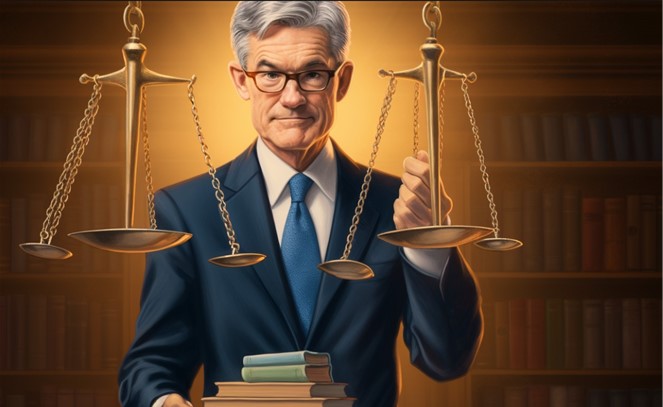
Federal Reserve Chairman’s Speech at Jackson Hole Symposium Sparks Speculation on Subject and Market Impact
There’s an economic concept that is expected to be included in Fed Chair Powell’s next speech that may soon become the new buzzword. It may be worth a minute now to be sure there is a thorough understanding. Especially if his address at the Jackson Hole Symposium begins to drive markets one way or the other. Other news outlets say Powell’s address may be a pivotal moment that could potentially reshape the stock market landscape. Last year they said the same thing, but instead his address was a yawner, ultra-safe, with no new information for the markets to use.
Scheduled for 10:05 ET Friday morning, Powell’s address, it is said, may center around the concept of the neutral rate of interest, a theoretical but influential notion that holds the potential to send ripples through financial markets.
The neutral rate of interest, also referred to as r* or r-star, represents the level of real short-term interest rates anticipated to prevail when the U.S. economy is at its peak strength and inflation remains stable. Analysts estimate this real neutral rate to be around 0.5%, calculated by deducting the Federal Reserve’s 2% inflation target from policymakers’ latest predictions for the long-term trajectory of the fed funds rate. Speculation suggests that the neutral rate might be on the rise, given the current economic performance.
Amidst an environment where the U.S. economy appears to be gathering momentum, even following a series of interest rate hikes that brought rates to a 22-year high of 5.25%-5.5%, the stakes are high for determining the correct theoretical level for the neutral rate. The economy achieved a robust growth rate of 2% in the first quarter, followed by 2.4% in the second quarter. The Atlanta Fed’s GDPNow model projects an astonishing 5.8% growth rate for real gross domestic product in the third quarter, a figure met with skepticism but indicative of the economy’s notable resilience.
Investors will be hanging on the Fed chair’s every utterance, clarity from Powell’s address to better comprehend the Fed’s perspective on this crucial neutral rate. What a higher neutral rate could mean is policymakers could find themselves compelled to implement additional hikes to fed-funds. This scenario would result in longer periods of higher borrowing costs and a delay in the timing of the first rate reduction.
Traders and investors have already adjusted their expectations to anticipate the Federal Reserve maintaining elevated interest rates for a longer period.
This year has seen significant gains in the stock market, with the Dow Jones Industrial Average (DJIA) rising by 4%, the S&P 500 (SPX) surging by 15.5%, and the Nasdaq Composite (COMP) leading the pack with a remarkable 31.1% increase. Investors and traders are cautiously optimistic about a scenario where the U.S. economy navigates a soft landing, with inflation trending downward.
In the days leading up to Powell’s speech at the Kansas City Fed’s Jackson Hole symposium, the Treasury market has already incorporated expectations of stronger-than-anticipated U.S. economic growth. Yields for 10-year and 30-year Treasury bonds reached multiyear highs, though they retraced slightly in the days following. However, market participants anticipate potential fluctuations in response to Powell’s remarks, which could trigger further yield adjustments.
The recent upswing in yields, leading to the highest closing levels since 2007 and 2011 for the 10-year and 30-year rates, respectively, has been given as the reason for the decline in U.S. stock values during August. The S&P 500 experienced a decline of over 3% during the month.
Take Away
Understanding r* or r-star in advance may prevent some scurrying at 10:10 AM ET tomorrow. While Market participants eagerly await Powell’s speech, hoping for insights that will shed light on the Federal Reserve’s outlook regarding the neutral rate and its potential impact on monetary policy and the stock market, last year his words were short, and seemed to be designed to convey nothing new.
Managing Editor, Channelchek